メンバー
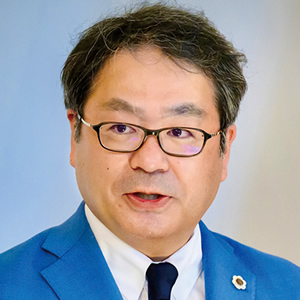
稲垣 史生
Fumio Inagaki
副研究所長 / 研究部門長
- ユニット海洋微生物生態系変動研究ユニット
- 職名上席研究員(JAMSTEC) / 教授(東北大学)
- 所属JAMSTEC
- E-Mail
Please Enable Javascript
- 所在地〒236-0001
神奈川県横浜市金沢区昭和町3173番25
国立研究開発法人海洋研究開発機構 横浜研究所 フロンティア棟2階
専門分野
地球微生物学、生物地球化学、微生物生態学、地球生命工学、サステナビリティ科学
略歴・研究概要
Fumio Inagaki is a geomicrobiologist, Vice Director, Division Director for Research, and Professor/Principal Investigator of the World Premier International Research Center Initiative (WPI) Advanced Institute for Marine Ecosystem Change (AIMEC), co-hosted by Tohoku University & Japan Agency for Marine-Earth Science and Technology (JAMSTEC)(2024.1-present). He is also Project Leader of the Ocean Basalt CCS Basic Research, one of the four Ocean themes of the SIP (Cross-ministerial Strategic Innovation Promotion Program, the Cabinet Office of Japan), JAMSTEC. He is appointed Guest Professor at Kochi University, Japan (2020.4-present).
Fumio Inagaki received his Ph.D. from Kyushu University, Japan (2000), under the supervision of Prof. Seiya Ogata, studying thermophilic microbial communities associated with silicate mineralization in geothermal power plants. He joined the Deep-Sea Frontier Research Program of JAMSTEC as a researcher under the supervision of Prof. Koki Horikoshi. His research interests are in the geomicrobiology and biogeochemistry of the ocean, with special emphasis on the deep subseafloor biosphere and marine ecosystem change. He has used scientific ocean drilling and cutting-edge transdisciplinary approaches to explore the nature and limits of deep microbial life, ecosystem functioning in biogeochemical carbon cycles, co-evolution of life and Earth, and planetary habitability on Earth and beyond. He was a shipboard microbiologist for the first deep biosphere-dedicated scientific ocean drilling on the US drilling research vessel JOIDES Resolution, Ocean Drilling Program (ODP) Leg 201 in the eastern equatorial Pacific and off Peru in 2002. In deep-sea research using Shinkai 6500 and ROVs, he first isolated two novel mesophilic chemolithoautotrophic epsilon-proteobacteria (Sulfrimonas autotrophica gen. nov., sp. nov. 2003, and Sulfurovum lithotrophicum gen. nov., sp. nov. 2004) from the Okinawa Trough hydrothermal fields, which isolates were appeared to be the most abundant, ecologically significant sulfur and/or hydrogen-metabolizing bacteria distributed in cold seeps and deep-sea hydrothermal environments worldwide. In 2005-2006, he was an Alexander von Humboldt Foundation Research Fellow at the Max Planck Institute for Marine Microbiology in Bremen, Germany, under the supervision of Prof. Bo Barker Jørgensen. Upon his return to Japan, he served as Deputy Director of Kochi Institute for Core Sample Research (KCC) and then as Deputy Director of the Research and Development Center for Ocean Drilling Science (ODS) at JAMSTEC.
As of today, he has participated in 30 scientific research cruises, serving as (co-)chief scientist for 15 expeditions, including 3 co-chief expeditions; Integrated Ocean Drilling Program (IODP) Expeditions 329, 337, and International Ocean Discovery Program (IODP) Expedition 370. In 2012, during IODP Expedition 337 with the Japanese riser-drilling research vessel Chikyu, his international team extended the world record depth of previous scientific ocean drilling down to 2,466 meters below the seafloor, revealing the deep subseafloor microbial communities in ~20-million-year-old coal and shale beds. His research focuses on the global abundance, biogeographic distribution, and diversity of subseafloor microbial communities (Archaea, Bacteria, and Eukaryotes), the response and adaptive mechanisms of marine ecosystems to Earth system change, long-term survival strategies, and limits of life, geosphere-biosphere interactions, and planetary habitability. Based on his knowledge and experience in geomicrobiology and scientific ocean drilling, he also conducts sustainability science for the development of carbon neutral systems, including carbon capture and storage (CCS) into the seamount basalt under the Strategic Innovation Promotion Program (SIP) Ocean Theme 4, supported by the Cabinet Office of Japan (since 2023).
He has published more than 220 peer-reviewed international articles and book chapters and around 80 Japanese articles with more than 250 media reports. In 2015, he was the first awardee of the American Geophysical Union (AGU)-the Japan Geoscience Union (JpGU) Asahiko Taira Scientific Ocean Drilling Research Prize (Taira Prize). His work and contribution to the scientific community were also recognized with the Cozzarelli Prize of the National Academy of Science in 2017 (Category IV), the Copernicus Medal in 2019 at European Geophysical Union (EGU), the Special Award of the Japan Association for Petroleum Technology (JAPT) in 2021, the Geochemistry Fellow of Geochemical Society (GS) and European Association of Geochemistry (EAG) in 2021, and the AGU Fellow in 2021. In 2023, he was awarded the Philipp Franz von Siebold Prize by the Alexander von Humboldt Foundation and the President of the Federal Republic of Germany. Also, in 2024-2025, he was awarded by the Hanse-Wissenschaftskolleg (HWK) Fellow, Germany. He is currently an associate editor of Science Advances, AAAS (since 2019), and an Advisor of Earth 4D: Subsurface Science & Exploration, CIFAR, Canada (since 2019). His international academic service also includes being the Program Committee Co-Chair of the JpGU-AGU Joint Meeting 2020 and the International Planning Task Force Chair for the JpGU-AGU Joint Meeting 2026. He was a Guest Professor at Waseda University (2020-2024) and has been appointed as a Guest Professor at Kochi University, Japan (2020.4-present). Since 2024, he is Vice Director, Division Director of Research, and Professor (PI) of the World Premier International Research Center Initiative (WPI) Advanced Institute for Marine Ecosystem Change (AIMEC), Tohoku University and JAMSTEC.
関連情報
-
2025.11.21
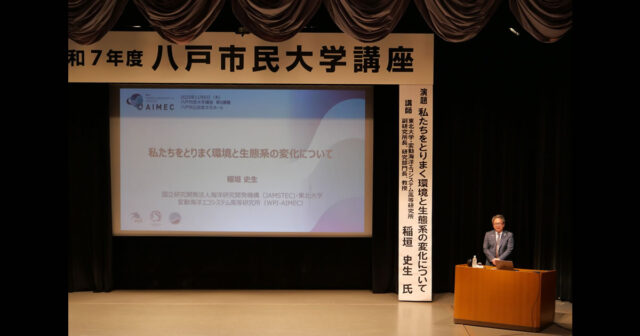
稲垣 副所長が八戸市民大学講座で講演しました
-
2025.11.20
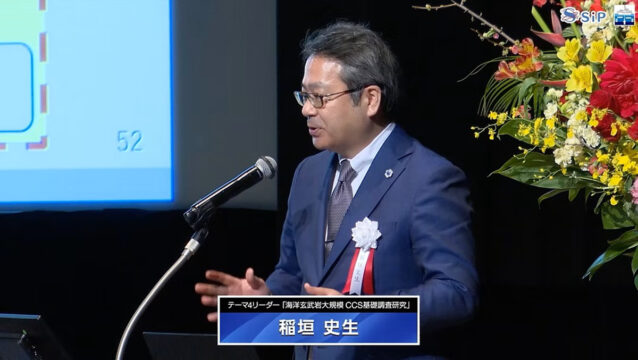
内閣府戦略的イノベーション創造プログラム(SIP)第3期2025年度報告会で稲垣 史生 副所長が講演します
12月4日(木)13:10~17:00
-
2025.10.30
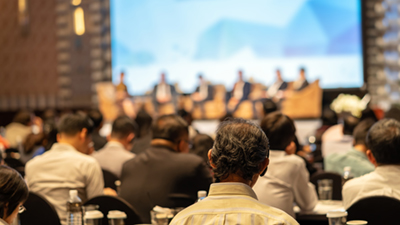
稲垣副所長がSOKAPシンポジウムに登壇します
-
2025.10.28

WPI-AIMEC稲垣 史生 副所長が八戸市民大学講座で講演します
2025年11月6日(木) 18:30~20:00
-
2025.01.28
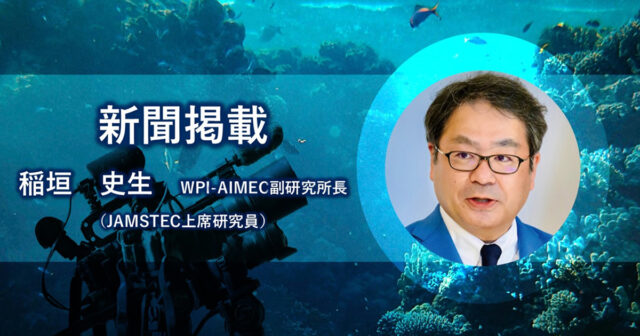
稲垣 史生 副所長の玄武岩CCSに関するインタビュー記事が東京新聞・中日新聞に掲載されました
-
2024.11.22

内閣府戦略的イノベーション創造プログラム(SIP)第3期報告会で稲垣 史生 副所長が講演します
11月29日(金)13:10~17:00
一般視聴可
-
2024.07.25
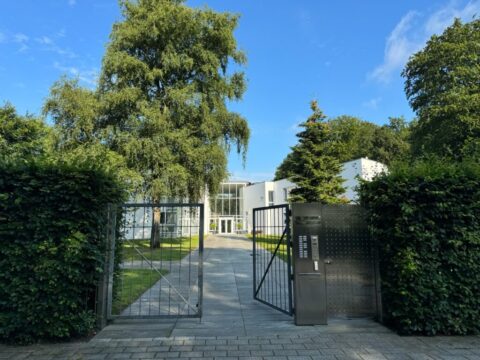
稲垣副研究所長がドイツ・Hanse-Wissenschaftskolleg(HWK)フェローに選出されました
-
2024.06.27
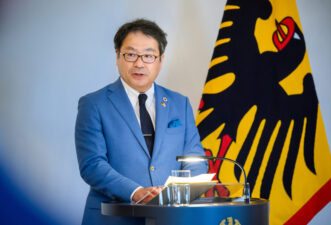
稲垣副研究所長が、6/8(土)の日本フンボルト協会総会・講演会で基調講演を行いました

